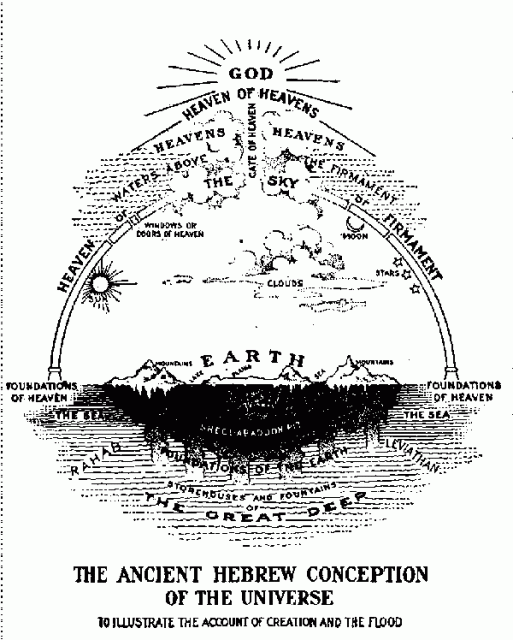All I'm saying is that I never got the impression that the Bible claimed the world was flat.
And I'm saying that of course you didn't because you live in the 21st century not the 6th century. Had you lived in the 6th century, you might have thought the Bible said the world was flat. There were Christian scholars at the time denouncing the pagan (i.e. Greek) philosophy which claimed the earth is a sphere. And had you lived a few hundred years earlier than that, it would have been obvious to you and everyone you knew that the world was flat and that the scriptures affirmed this.
We all bring our own social-historical lenses to scripture and it is important to realize that personal impressions include these lenses.
Not sure what you're saying. All i'm saying is that I don't base my beliefs on decrees within churches. Otherwise i'd be Catholic. No offense to Catholics intended.
And all I am saying is that you don't live in a sealed cave. You may not believe what the Catholic church teaches, but you do believe what your church teaches--what you have been taught ever since you began attending church--whether that was a few months ago or since you were a toddler. So you do base your beliefs on the views of some church. Doesn't matter that it's not the Catholic or Orthodox or Lutheran or whatever.
No, i'm not choosing not to know. Admitting that some things are impossible to know with 100% certainty and choosing not to know are totally different.
It's not just some things. Nothing concrete can be known with 100% certainty. The only things that are certain are mathematical relationships--but they are abstract--not things in themselves.
OTOH, we can be quite certain that some propositions are definitely false.
What you are really saying is that you still want to believe some things are true even though they have been proven false. Can we be certain the universe is 13.7 billion years old? No, it might be 13.75 billion years old.
Can we be certain that the universe is not just a few thousand years old? Absolutely.
Just get back to me when you have all the answers, 'cos until you do you can't tell me that I need to chase after them. That's not being morally superior, it's not even a question of morality.
I never claimed you need to chase after the answers. And nobody has, or will have, all the answers. But not having all the answers doesn't mean we have no answers. And since you are not chasing the answers, you have no call to say those who have found answers are wrong. You want to believe they are wrong. That's your privilege. You want to show they are wrong--you need to chase down some better answers.
You're getting more and more carried away bro. I don't disregard ALL science. I just don't trust all science as canonical. I don't disregard it completely, I just don't need to solidly prove some things 100% or speficially tie everything in Biblically.
Do you think scientists treat science as canonical? Shows how little you know about science. I agree, we don't need to specifically tie everything in Biblically.
I'm not making prejudicial "judgements" about scientists, I'm just stating my opinions.
Ok. Your prejudicial opinions then.
I'm sure they have far worse things to say about me. If you can find me one useful, practical reason to seek a 100% scientific understanding of creation (other than for fuelling one's own ego) in the Kingdom of God, then please get back to me.
Sure, there is a useful practical reason to seek scientific understanding of creation: with better understanding, we are more and more amazed by what God has done and more delighted in and appreciative of God's work. The deeper our knowledge of creation, the deeper and more heartfelt our praise and adoration of the Creator.
But I don't know of any scientists who would claim we have or are likely to get 100% understanding. Every new understanding also leads us into deeper questions. To know the whole creation 100% would require an equivalent knowledge of God himself and even in the Kingdom of God, that will still be a mystery no created being will ever attain.
God already warned Job against that kind of thinking. That's enough for me. I don't want to try to figure out all the work of the Creator and I'm not sure why some human beings (Christian and otherwise) are so locked into trying to do so.
Did not Jesus tell us to love God with (inter alia) "all your mind"? Trying to understand the work of the Creator is one way we obey Christ in this regard.
Scientists: Get back to me when you can tell me with 100% certainty, exactly how the physical universe came to be as we know it.
Won't happen because science doesn't give us that sort of knowledge. But on some things it does give us 99.999% certainty. Shall we turn our back on what is practically certain just because it doesn't meet an unobtainable philosophical absolute?
Shall we, on the basis of being 0.0001% away from absolute certainty claim that what is definitely false could still be true?
In the meantime, while you're focusing on those questions, I'll ponder more important things like how much time I'm actually spending with Jesus, and what I'm doing to spread the gospel.
That's a good idea. It would help to ditch false stereotypes of those who do choose to focus on scientific matters as well.
Upvote
0




